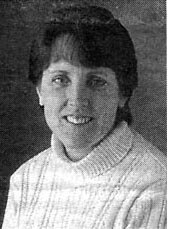
Academy of Applied Science
SPARKS:2002
Making a Difference with "A Spark That Caught Fire"
by Irene G. O'Mara, REAP Director

In 1980, a $2500 stipend was considered a sizeable amount of money when the initial Research and Apprenticeship Program grants were awarded. Those first REAP grants created an excited stir among the professors/mentors, not only for the opportunity, but also as a result of that substantial sum, $2500. The amount was divided equally between apprentice and mentor.
In that heady first year, we at the Academy of Applied Science were able to get most of the host universities to waive the overhead so that all funding went directly to the program.
Today, all of the universities have followed suit and have waived the overhead.
One standout student from that very first year is Nancy E. Hynes (now Dr. Nancy Bonthius). A student from the University of Iowa whose alias could be, "A Spark that Caught Fire," she was selected as an apprentice to assist in research in the chemistry field.
"Nancy was an enthusiastic worker, always eager to learn and unafraid to try something new. She caught on to things quite rapidly and was competent in her preparations by the second month. I was quite pleased at her progress, her interest and enthusiasm," stated Professor Burton, who, after being awarded the grant, ran the interview and selection process. The same selection process that singled out Nancy continues today.
After graduating from the University of Iowa College of Pharmacy in 1986 with a Bachelor of Science degree in Pharmacy, Nancy went on to complete a hospital residency-training program at the University of Iowa Hospital.
At the University of Iowa College of Pharmacy, Nancy received her Doctor of Pharmacy in 1990. Nancy's professional experience began at the University of Virginia's Department of Pharmacy as a clinical staff pharmacist, where she went on to serve as a drug information specialist and clinical assistant professor of pharmacy before returning to the University of Iowa in 1994.
In her present capacity as assistant professor of pharmacy, the University of Iowa recently honored her for the second time with a Collegiate Teaching Award.
A fourth-year pharmacy student wrote, "Dr. Bonthius is unique in her enthusiastic dedication to teaching and to students. She is among the most open and approachable professors I have encountered. Her expectations are clear and fair. Her interest in students is apparent and extends beyond the classroom. She is thoughtful, flexible and encouraging. Her passion for what she teaches, and for teaching itself, is inspiring."
Sixteen faculty members were named recipients of the 2001-2002 Collegiate Teaching Awards for demonstrating unusually significant and meritorious achievement in teaching. The honor carries a $2,000 award.
The winners, named each year by the Council on Teaching, are nominated by students and faculty. Award winners are chosen based on how their teaching and informal contacts enhance student learning, an analysis of teaching materials and class activities, scholarly works or creative achievements and student evaluations of the nominee's teaching ability.
Coming full circle, and some 22 years since her apprenticeship, Nancy has agreed most eagerly to become a REAP mentor herself. What a golden circle! We really are MAKING A DIFFERENCE.
Twenty-two years later, however, that $2,500 stipend remains the same. Even though the professors/ mentors are still as eager to be awarded the grants and to conduct the program, they all report finding it more difficult each year to attract qualified students. "We are losing the best students and those who could benefit the most," they report. "The $1250 the student receives for the entire summer is no longer
competitive."
?
?
?
?
?
?